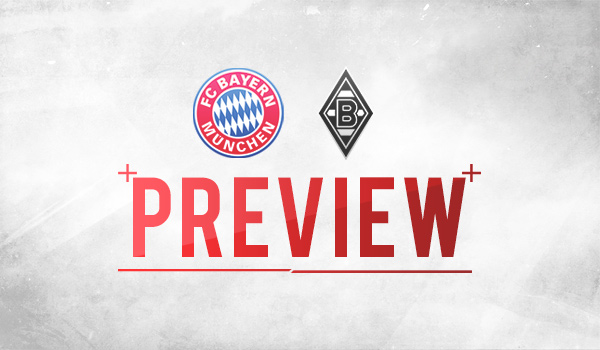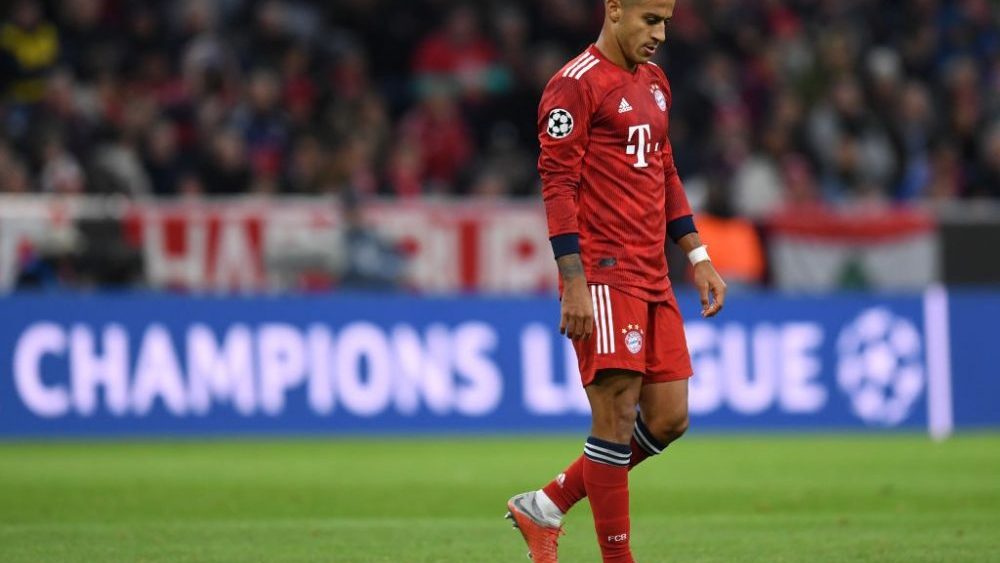Preview: FC Bayern – Borussia Mönchengladbach
Always a step too late. Always a bit too hectic. Always a little bit too imprecise. Always a touch more uncertain. Bayern didn’t start badly against Ajax, but let themselves be lured into a false sense of security by the guests. A situation arose in which the team made too many bad decisions.

Tempo too high
That was most of all down to the aforementioned hecticness. “We didn’t manage to set up camp in the opposing half,” analysed Müller. Kimmich added that they’re currently struggling to pin teams back into the box and generate chances.
Both spoke to the crux of the current problems. When Kovač speaks of how the team didn’t get stuck in, then it’s more than just a cliché. Due to the high tempo upon turnovers it’s not just a lack of calmness and secureness. There’s a dearth, above all, of correct positioning.
The distances were too large both horizontally and vertically. If passes were misplaced due to the high risk, the routes back into counter-pressing were too long. On top of that was Bayern’s increasing uncertainty, as with each misplaced pass they became more nervous and lunged into risks even more quickly. A vicious cycle that only came to an end towards the conclusion of the game due to the guests tiring.
Kovač will have to make tweaks here. Being spread out wide can certainly make sense in the game. But mostly only if you want to open up the opposition with longer passing sequences. The players’ patience and also positioning weren’t good enough for that.
Gladbach know of Bayern’s weaknesses
Whether Borussia Mönchengladbach are now the right opponents at the right time is debatable at the least. Borussia still haven’t won away from home at any rate. However, Dieter Hecking will have taken notice of FC Bayern’s last three games.
Against Wolfsburg his side operated with some man-marking in midfield, though this became more of a disadvantage in its extreme execution. In spite of that it’s possible that Gladbach would also like to proceed with man-oriented pressing against Bayern’s unstable centre.
Lately Hecking has gone for a 4-3-3 with Kramer and Neuhaus in the engine room. In addition came either Zakaria or Hofmann. Particular Kramer and Zakaria would make sense against Bayern’s half-spaces with their pace and power. Above all, however, they can also get free under pressure and outmanoeuvre opposing pressing.
This has been Bayern’s biggest weak-point lately. With high risks taken in their own passing, turnovers were punished directly. Either the box-to-box midfielders were too high up upon losses of possession or the distances between defence and attack weren’t right. In both cases there were situations in which the opposition could run at the defence at pace.
Gladbach have that pace. And they have technically strong players who are capable of playing around Bayern’s pressing if there’s too much distance for FCB players to cover again.
The fact that the individual quality of a Boateng is lacking and also that the back four as a result is good for a mistake or two is then just the cherry on a cake that FC Bayern would have liked to have avoided. Above all the tactical deficits and the resulting imprecise pressing are currently the spanners in the works.
In any case, too much is being blamed on the quality of individual players. “Kovač trusts the old guard too much!”, some are saying. In fact it was Kovač who was the first Bayern coach to actually put some trust in Renato Sanches. It was also Kovač who played Coman instead of Robben in the opening match, making an early statement in doing so. And what was the name of that coach who put Martínez on the bench regularly because Thiago is a lot more valuable there strategically? That too was Niko Kovač.
There’s no question that he’s now made some bad decisions. Standing by and watching Martínez add no surplus value to the game, rather slowing it down, was hard to understand. Also the calls for Gnabry coming in for a Ribéry who has been floundering for weeks were clear and understandable. Still, Kovač is still trying things and is aware of the problems in midfield. Otherwise he wouldn’t have made changes.
Maybe Kovač doesn’t yet see Gnabry, for example, as capable of playing in such a situation from the start. Ribéry may well sprinkle in too many unnecessary turnovers in his dribbling, while Gnabry brings more penetration and inclination towards goal. But Ribéry at the moment is indeed still the better combination player.
Both in Berlin and against Ajax were there situations in which Bayern combined down in the left half-space to get into the penalty area. That was partly down to the Frenchman serving as a reference point. With Gnabry that was no longer possible. The new arrival is still a bit of a stranger to correct positioning on the pitch, and is partly too chaotic.
Kovač, then, must find solutions in order to integrate Gnabry into Bayern’s combination game. Then he can become the player who finally brings some pace into the attack in Coman’s absence, which is currently lacking. Here too, however, plays the midfield a role.
If before it was sensible to isolate Ribéry and Robben, it now makes much more sense to integrate them. The aforementioned combinations only work when the half-space is occupied accordingly. To make that possible the midfield has to shift their positioning.
With Martínez, often standing around in no-man’s land, and Thiago, who dropped deep to guide the build-up, only Thomas Müller remained in an advanced position, lacking any connection. Kovač has to plug that gap. Thiago seems indispensable as a defensive midfielder. It’s unthinkable what would happen if he too were to get injured. Then Rudy’s sale would presumably be twice as painful.
Here James is probably the best playmaking option. Then, however, the Columbian would also have to operate deeper than recently to reduce the amount of ground Thiago has to cover and to provide more security to Bayern’s passing. Further forward either Müller could continue to make his runs or a more dynamic type of player like Goretzka could be brought in, though he would then have to be better integrated into ball circulation than recently.
If Niko Kovač wants to ensure against Gladbach that his side isn’t a step too late again, doesn’t operate too hectically again, doesn’t play so many imprecise passes again and thus doesn’t lose its confidence as a result again, he firstly has to get to grips with his midfield three. If the balance there is right once more, a victory against Gladbach is very likely.




 October 4, 2018
October 4, 2018 


